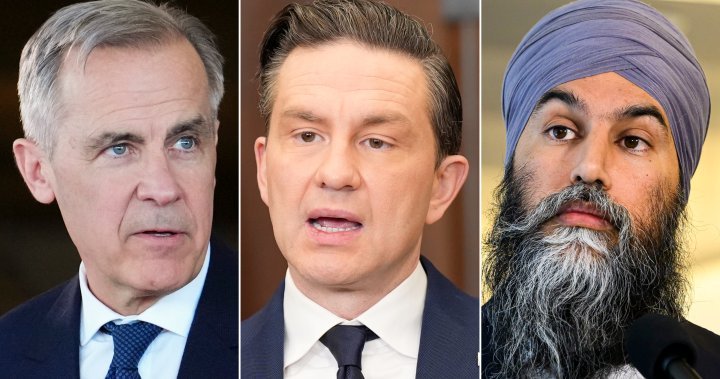As Canadians prepare to vote in the federal election on Monday, U.S. President Donald Trump has resumed his attacks on the country’s auto sector and sovereignty, prompting Canada’s party leaders to once more stress they will fight to protect both.
On Wednesday, Trump told reporters it was possible his 25 per cent tariffs “could go up” for cars made in Canada, before repeating his assertion that Canada should be a U.S. state.
While the president’s escalation of his trade war on Canada and countries around the world has continued throughout the federal campaign, his rhetoric around Canada’s sovereignty has largely quieted during the past several weeks.
White House press secretary Karoline Leavitt said last week that Trump still wants Canada to become the country’s 51st state, but it was Wednesday that Trump made it clear it was something he still desired.
“I have to be honest, as a state, it works great,” Trump said. “As a nation, considering the fact that, you know, 95 per cent of Canada, what they do is they buy from us, and they sell to us … it doesn’t make sense. If we needed something, that would be a different subject.”
Trump’s comments came weeks after his first call with Prime Minister Mark Carney in March.
Carney, who is running in the election as Liberal party leader but remains prime minister of a caretaker government, reiterated on Thursday that it would “never happen,” noting he told this to Trump in that phone call.
“The president has certain things in his mind that he reverts back to all the time,” Carney told reporters.
“He raises it all the time, OK, but then the question is what’s going to be done with it and does he understand where we stand, but more particularly where I stand, he is under no illusions: never, absolutely not, never, move on.”
He went on to push the party’s plan.

Get daily National news
Get the day’s top news, political, economic, and current affairs headlines, delivered to your inbox once a day.
“It gives us leverage in the negotiation, we don’t have to deal in the short term, we will do the right deal,” he said.
Conservative Leader Pierre Poilievre told reporters in Halifax that his party, if elected to government, would defend Canada’s sovereignty.
“We will never be an American state and we will focus on what we can control,” Poilievre said.
“It’s time to put Canada first for a change with a new Conservative government that will axe taxes, build homes, unleash resources, stop crime and bring home jobs to stand up to Trump from a position of strength.”
Similar words were also said by NDP Leader Jagmeet Singh in Winnipeg.
“It’s certainly having a massive impact on our country and it’s a threat to our sovereignty,” Singh said. “We will never be the 51st state, not now, not ever.”
The NDP leader also pushed his party’s plan to defend Canada’s assets.
“We are going to make sure that we will never let certain values that we hold dear ever be on the negotiating table,” Singh said, citing labour rights, the health-care system, Indigenous rights and jobs.
Carney also faced questions on Thursday about his first phone call with Trump, which took place on March 28 and during which Carney said the president had “respected Canada’s sovereignty.”
The question came after Radio-Canada reported Thursday that Trump had brought up making Canada the 51st state during that call.
Carney confirmed to reporters that Trump had brought up the “51st state” in the phone call, but noted the conversation still led to an agreement to hold negotiations about the U.S. and Canada’s partnership “as sovereign countries.”
“The president says lots of things, but the essence of the discussion and where we move the conversation to is exactly what I said, (he) treated us with respect as a sovereign nation,” Carney said.
During his first press conference following the phone call with Trump on March 28, Carney was asked by a reporter: “Can you give us a sense of the tone that Donald Trump struck with you on the call? Did he call us the 51st state? Did he call you the governor or was he more respectful like he was in the Oval Office?”
Carney did not specifically answer the question about whether Trump had called Canada the 51st state.
“It was a very cordial, substantive call. This was a call between two leaders of their respective governments, between two sovereign nations. The spirit of the call was both cordial and focused on making progress,” Carney said.
“You had several things. One is an agreement, which is what I wanted, but I think he wanted as well — and I’ve been clear about this for a number of weeks — to have a comprehensive discussion on our broader economic, security partnership. We agreed to that.
“Also, to have intensive discussions between our ministers, including, obviously, the minister of foreign affairs, who kindly is here.
“So positive, cordial, constructive, focused on action, exactly what we want.”
Additional reporter questions did not press on it again during that press conference, and Carney said in response to a different question about whether Trump respected Canada’s sovereignty: “The president respected Canada’s sovereignty today, both in his private and public comments.”
Asked about the phone call, Poilievre said reporters would need to ask Carney about it as he was not on the call, but went on to speak about his party’s defence of sovereignty.
Singh was critical of the Liberal leader over the report, telling reporters that Carney was “not being straight-up with Canadians.”
Millions of Canadians have already voted in early and advance polls, with Elections Canada reporting a record-breaking 7.8 million having voted over the advance poll weekend.
Read the full article here
